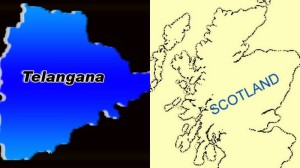
Try typing Telangana on Google and one of the top suggestions you will find is “Telangana issue”. I guess at this point of time there is no surprise that Telangana is known for all the wrong reasons. The question is why Telangana is in such a mess?
Let’s look at the issue in simple terms. Andhra Pradesh(AP) is a state which was formed post independence. Even during that time there was reluctance for Telangana to join Andhra Pradesh. Telangana forms approximately 40% of AP and accounts for 75% of the state’s revenue with the majority coming from Hyderabad which is the capital city. There has been a feeling of exploitation being part of AP as Telangana generates almost three- fourths of the state revenue. This forms the core issue behind requests for a separate Telangana state.
The issue was present in 1956 when Telangana was merged with AP and continues even today. So after 5 decades of peace and violence the Indian Government decides to carve a new state called Telangana. The point to be noted in this is that the Indian central government decides to create a new state and not the people of AP or Telangana even.
This brings me to the question of democracy in India. What is democracy? Abraham Lincoln quoted “Democracy as the government of the people, by the people and for the people”. In actual fact most countries follow a representative democracy rather than a direct democracy where the elected members of the people makes decisions for them and India is also 1 of the countries with a representative democracy. So the Indian government which is the elected representative of the people decide to create a new state.
Now let’s look at the issue of Scotland. Scotland is part of the British Union which is based on a treaty in 1707 and Scotland has remained part of the union till date. Scotland also wants to become a separate nation mostly for economic reasons for several years. In 1997 Scotland formed its own parliament and got some powers of governance over Scotland which it could exercise independent of the UK parliament/government. The concept of home rule or an independent Scotland has been there for ages and the SNP won the elections in Scotland and vowed to hold a referendum on independence by 2010. Although this wasn’t possible due to political reasons, it won the elections again in 2011 and had promised the Scottish people a referendum by 2014 or 2015.
What’s a referendum? Referendum is a direct vote by all of the electorate in relation to a particular proposal. This is an example of a direct democratic exercise. In Scotland the Scottish people get to decide whether they want to be an independent country through the referendum vote which is set for the 18th of Sept 2014. So the proposal was introduced in March 2013 and it gives 18 months for various political parties to voice their views/opinions on it and then let people of Scotland vote on it.
The point that we need to be clear here is that UK also has a representative democracy (although Monarch is the head of state) but on major issues like Scotland they have a referendum. The conservatives have promised that if they are re-elected there will be a referendum on whether UK should be part of the EU.
Switzerland is another country where referendums are used and there was a recent referendum on limiting EU migrants. Although this vote has created more storm in the EU- Swiss relations it is another example of using referendum as a tool to make major policy decisions.
The question now is “Is India ready to have referendums on major policy decisions like the Telangana issue to reach a democratic and amicable solution?” Can the people of Telangana decide whether they want to be part of AP? Will they ever get a choice?






